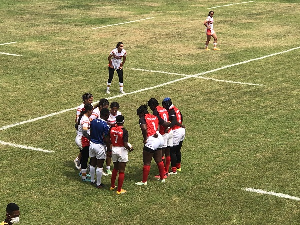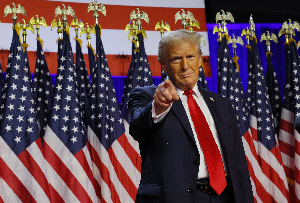Of the scores of billboards displayed across the rugged expanse of the Obuasi gold mine in southern Ghana, one stands out. While some display bullion prices and others remind workers to put safety first, this one reads: "$150 is our goal. Yebetumi Aye!" (all hands on deck).
The tone of the message reflects how seriously the mine's owner, Ashanti Goldfields, is taking the slump in the world gold price. The aim is to encourage the mine's 6,500 workers to help keep the cash operating cost per ounce of gold extraction as low as possible.
But for Ashanti, this is only one of the challenges it faces if it is to survive the main consequence of the persistently low gold price: frantic industry consolidation.
Ashanti - the name is taken from the tribe that has dominated this region of Ghana for centuries - used to be one of the world's largest gold mining companies. With total production of 1.7m ounces in 2000 making it the fourth largest in Africa after Anglogold, Goldfields and Harmony Gold, it is still large. However, it faces being left behind as its peers merge or are taken over.
"Unless you can consolidate you can't be part of a response to the problem [of the gold price]," says Sam Jonah, Ashanti chief executive. But Ashanti is at a disadvantage to its peers on two counts.
The first is its poor financial health, legacy of a disastrous foray into the gold hedging market. Ashanti was pushed to the brink of default in 1999 when the gold price moved against its bets, prompting a wave of calls on its hedge book, and a damaged balance sheet that still overshadows the company.
Ashanti is also in talks with creditors about refinancing a $215m (?150m) convertible bond that falls due in 2003. Its cash position is not strong enough to withstand the level of cash redemptions that would be likely if its share price does not recover by 2003.
The second problem is political. The government of Ghana has a "golden share" in the company, engineered at its flotation in 1994 to give veto rights over corporate decisions.
Mr Jonah has started a dialogue with the government on the future of the golden share. He believes its removal is essential to Ashanti's participation in industry consolidation, because potential partners are put off by the government's blocking stake.
"The golden share is anachronistic. It was put in place to protect Ashanti at a time when it was a 'one-mine' company, when the industry dynamics were not as they are today."
Investors are also keen to see the removal of the golden share, which has helped depress the share price. "We've considered for a long time that the share price is trading significantly below [Ashanti's] net asset value, but this was unlikely to be realised until the company was seen as a potential acquisition," says Mike Jones of stockbrokers Canaccord Capital Europe in London.
There are few doubts about the quality of Ashanti's assets, which comprise seven producing mines in Ghana, Tanzania, Guinea and Zimbabwe.
To any potential buyer, Ashanti's main attraction is what it claims are significant gold deposits at the Obuasi mine, at depths not yet dug. Any purchaser would, however, have to be confident that the gold price will rise to levels that would make such extraction economically worthwhile.
The company has also managed three successive quarters of what analysts say are encouraging results. This includes bringing the cash operating cost of production down from $205 at the end of 1999 to $189 in the third quarter.
Removal of the golden share would be attractive to Ashanti's largest shareholder, the mining group Lonmin, which has 32 per cent and has signalled its willingness to sell at the right price.
The question is whether the Ghanainan government is prepared to let go.
A new government came into office in Ghana less than a year ago, ending 20 years of rule by Flight Lieutenant Jerry Rawlings. His successor, President John Kufour, has shown signs that he is more sympathetic to the private sector than the Rawlings administration.
But some government officials still express reluctance to contemplate selling the golden share, for pride in Ashanti's iconic status as Ghana's largest company.
The matter could come to a head soon as Ashanti appears to have made progress in talks with its convertible bondholders. It is understood that provisional agreement has been reached whereby creditors will delay the redemption of the bond by a further five years, if several conditions are met.
One of them is a successful resolution of the golden share issue. Ashanti officials are guardedly optimistic: "We've had the right noises from the government. But we need more than the right noises."


















